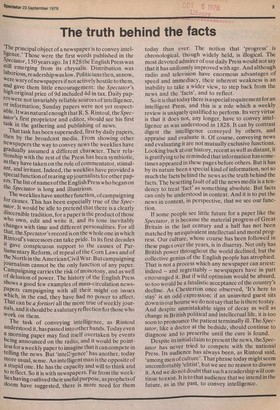The truth behind the facts
'The principal object of a newspaper is to convey intelligence.' Those were the first words published in the Sp.ectator, 150 years ago. In 1828 the English Press was Still emerging from its chrysalis. Distribution was laborious, readership was low. Politicians then, as now, were wary of newspapers if not actively hostile to them, and gave them little encouragement: the Spectator's high original price of 9d included 4d in tax. Daily papers.were not invariably reliable sources of intelligence, or information; Sunday papers were not yet respectable. It was natural enough that R. S. Rintoul, the Spectator's first proprietor and editor, should see his first task in the gathering and publishing of news. That task has been superseded, first by daily papers, then by the broadcast media. From showing other newspapers the way to convey news the weeklies have g.radually assumed a different character. Their relationship with the rest of the Press has been symbiotic, as they have taken on the role of commentator, stimulant, and irritant. Indeed, the weeklies have provided a Special function of rearing up journalists for other papers. The list of names of the English Press who began on the Spectawr is long and illustrious. The weeklies have another function, of campaigning for causes. This has been especially true of the Spectator. It would be idle to pretend that there is a clearly discernible tradition, for a paper is the product of those who own, edit and write it, and its tone inevitably changes with time and different personalities. For all that, the Spectator's record is on the whole one in which R. intoul's successors can take pride. In its first decades it gave conspicuous support to the causes of Parliamentary Reform, of repeal of the Corn Laws and of the North in the American Civil War. But campaigning Journalism cannot be the only function of any paper. Campaigning carries the risk of monotony, and as well of delusion of power. The history of the English Press shows a good few examples of mass-circulation newspapers campaigning with all their might on issues Which, in the end, they have had no power to affect. That can be a fortiori all the more true of weekly journals, and it should be a salutary reflection for those who work on them.
The task of conveying intelligence, as Rintoul understood it, has passed into other hands. Today even a morning paper may find itself overtaken by events being announced on the radio, and it would be pointless for a weekly paper to imagine that it can compete in telling the news. But 'intellgence' has another, today more usual, sense. An intelligent man is the opposite of a stupid one. He has the capacity and will to think and to reflect. So it is with newspapers. Far from the weeklies having outlived their useful purpose, as prophets of doom have suggested, there is more need for them today than ever. The notion that 'progress' is chronological, though widely held, is illogical. The most devoted admirer of our daily Press would not say that it has uniformly improved with age. And although radio and television have enormous advantages of speed and immediacy, their inherent weakness is an inability to take a wider view, to step back from the news and the 'facts', and to reflect.
So it is that today there is a special requirement for an intelligent Press, and this is a role which a weekly review is uniquely qualified to perform. Its very virtue is that it does not, any longer, have to convey intelligence as was understood in 1828. It can by contrast digest the intelligence conveyed by others, and appraise and evaluate it. Of course, conveying news and evaluating it are not mutually exclusive functions. Looking back at our history, recent as well as distant, it is gratifying to be reminded that information has sometimes appeared in these pages before others. But it has by its nature been a special kind of information, not so much the facts behind the news as the truth behind the facts. The besetting fault of all the news media is a tendency to treat 'fact' as something absolute. But facts can only be understood in context. And it is to put the news in 'context, in perspective, that we see our func
tion.
If some people see little future for a paper like the Spectator, it is because the material progress of Great Britain in the last century and a half has not been matched by an equivalent intellectual and moral progress. Our culture, whose course has been followed in these pages over the years, is in disarray. Not only has British power throughout the world declined, but the collective genius of the English people has atrophied. That is not a process which any newspaper can arrest: indeed — and regrettably — newspapers have in part encouraged it. But if wild optimism would be absurd, so too would be a fatalistic acceptance of the country's decline. As Chesterton once observed, 'It's here to stay' is an odd expression: if an uninvited guest sits down in our bourse we do not say that he is there to stay. And despite unmistakable signs of decay as well as change in British political and intellectual life, it is too soon to pronounce the patient terminally ill. The Spectator, like a doctor at the bedside, should continue to diagnose and to _prescribe until the cure is found. Despite its initial claim to present the news, the Spectator has never tried to compete with the national Press. Its audience has always been, as Rintoul said, 'among men of culture'. That phrase today might seem uncomfortably 'elitist', but we see no reason to disown it. And we do not doubt that such a readership will continue to exist. It is to that audience that we intend in the future, as in the past, to convey intelligence.


































































































 Previous page
Previous page